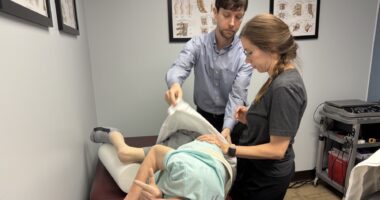When a nod to life’s most important work happens years later

My late mother, an accomplished pianist named JoAnn Derden, used to perform double-piano concerts with her sister, who insisted that the music — intricate, demanding classics — be memorized. Mom begrudgingly obliged.
When those stressful days ended, Mom enjoyed improvising and playing two-piano music with me — no memorization necessary, not even during performances.
Mom’s two concert grand pianos were eventually replaced with two digital grand pianos. What a new world they opened! With the mere push of a button or a simple key maneuver, we could instantly put ourselves on stage, accompanied by an orchestra! We sounded like pros as we covered old favorites: Broadway, standards, Streisand, and much more.
We even composed some songs. We had a great time with our newfound productivity, and when professional keyboards were added later, we were on a roll.
In my column, I’ve often mentioned my optimistic nature. Though it’s not always easy in the midst of devastation, it’s crucial for my mental and emotional health to appreciate what’s positive in life — or to track it down, if necessary. I was recently reminded that such appreciation can spring forth at any time.
‘Dreams’ and ‘The Jeffrey Journey’
My husband, Randy, and I consulted with a pediatric neurologist for our baby, Jeffrey. While we knew something wasn’t right, the diagnosis of SMA type 1 came from left field. Like most newly diagnosed SMA families in 1997, we were clueless.
As horrific as the neurologist’s description of SMA sounded, it was a mere blip compared with the prognosis: probable death by age 4 (which the genetics counselor revised the next day to age 2).
Mom wasted no time preparing a collection of original songs on a cassette for her final grandchild. Jeffrey loved them until he snagged his wings at 5 1/2 months old. “Dreams for Jeffrey” later became Mom’s first commercially duplicated CD of her original music.
“Dreams” accompanied the first edition of “The Jeffrey Journey,” a book I wrote about our abbreviated SMA assignment. The response to the book and the CD was favorable from both inside and outside the SMA community.
My father’s death, my mother’s awakening
Life stayed full. Randy coached high school football, and our children, Matthew and Katie, entered high school and college. The health of my father, Elton, began declining shortly after he and Mom moved into a house down the road from us. In a few short months, Dad’s earthly time ended, and Mom was hurled into solo mode.
Her return to the keyboard produced the CD “Grief: Loss and Recovery,” a heartfelt masterpiece unlike anything she’d done before. As was typical for her, she wrote nothing down.
Those who heard the music raved about it. An artist friend said she painted while listening to “Grief,” as it was the only CD she never tired of hearing.
Here is “Until We Meet Again,” from 2009’s “Grief: Loss and Recovery”:


